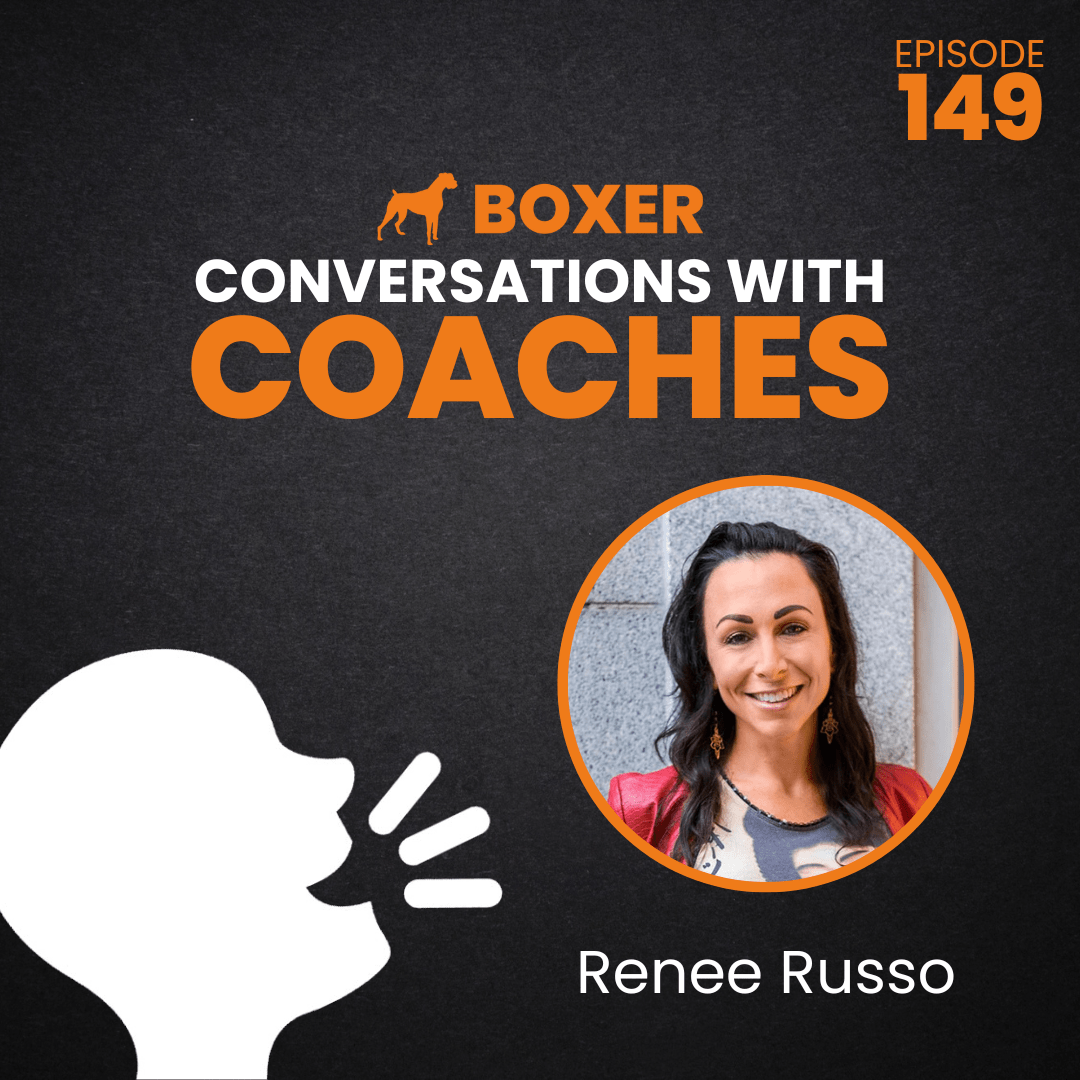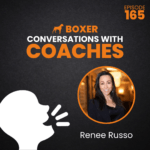Kevin Stafford 0:02
Hello everyone and welcome to another episode of the conversations with coaches podcast. I am your current host, Kevin, and I am about to interview someone who’s been on this podcast once before back when I was hosted by a certain Mr. Michael Pacheco, I had the pleasure of speaking with Rene Russo. Today. Renee is the CEO of rise up business coaching limited. As a certified EOS implementer. She helps entrepreneurs gain control of their business through the Entrepreneurial Operating System. Renee is also a certified Exit Planning advisor, a CPA, and helps entrepreneurs unlock their wealth and achieve their life goals. And I liked I love this phrase building their life by design. Well said, Rene, thank you so much for being here today. I’m excited to talk with you.
Renee Russo 0:45
Thank you for having me.
Kevin Stafford 0:47
Let me I like to start usually, with a sort of superhero origin story question like how how you got your start in the coaching business kind of I tend to ask it in two parts, because it’s a very familiar story for a lot of people even though the journey itself is very unique. How did you first discover or realize or who told you that coaching was something that you could do would do are doing could become already are becoming? And how did you go from that like moment of realization when it came to your your coaching abilities and your coaching desire to go from there into the business you have today?
Renee Russo 1:23
Great question. I discovered early on in life that I was very aware of other people, their challenges their needs. And now I understand that I’m an empath. And so I started that path. With the desire to help people, personally and professionally, I felt that their pain felt their struggles I wanted to help. And so I became or I attempted to be a fixer. And then I realized that the problems didn’t go away when I fixed them. They could only truly be addressed when I helped other people fix their own problems. So then I realized that I need to become more of a helpful helper, as opposed to a fixer. And so what that turned out to be looking like professionally, was teaching people tools and disciplines, and perspectives to help them understand their challenges. had the courage to take them on, and the resources they truly needed to solve their problems. And then discovered that that was called coaching. Here I am.
Kevin Stafford 2:48
I love that it’s such a, I find myself constantly thinking about that sort of classic analogy, when I’m talking to coaches is the give someone a fish, and they’ll eat for a night teach someone to fish, and they’ll eat for the rest of their lives, that kind of thing. It feels like at some point, driven by that desire to give back that desire to serve that desire to contribute and help people. There’s that realization that I think every coach has, where it’s like, it’s not just about me coming in to try to fix stuff. I mean, that might work for a short time, it might not, but it might for a short time. But ultimately, the real power, the real impact that you can have is in the equipping the guidance, you know, sort of the vision, and a little bit of encouragement, a little bit of a challenge that helps people to sort of basically like you’re saying, fix themselves, or at least get on that path to of fixing themselves upon the journey they want to be on and I love, I love that. I love how I love how common it is across all all different kinds of coaches no matter what the sphere is where personal professional relationship, executive career, all of the above there is that that guidance that is core to everything that a coach does, and I just love that.
Renee Russo 3:56
Absolutely. My dad literally had that quote, statement about teacher person, good fish for the day, though. To fish they’ll eat for a day. Teach them to fish, you know, give them a fish, they’ll eat for the day teach the fish, they’ll eat forever. Literally, I looked at that every single day as a child and understand as you say that well that was a really big part of this discovery of my desire to help people fish for themselves.
Kevin Stafford 4:29
Oh, it’s it’s funny how often we realized we look back and we realize we’ve been on this path for our entire lives but we just didn’t know it at the time. Part of that is telling our stories you know we tell we we tell ourselves the story of our lives as we’re living them and as we’re as we’re as we’re writing them down as we’re creating them but it’s always interesting. Interesting is not not the best way I find it fascinating to look back and see see the path that was laid before me that I look back I’m like, oh I had zero idea. The influenced that that person that quote, that book, that interaction that experience had on me, then that led me here. Now, it’s actually something I find that a lot of coaches are great at doing for other people haven’t experienced it themselves, their help, they help people to look, not just forward, not just at the present, but also a little bit backwards and realize not just the point that they’re at, but the path that they’re on. And they’re and therefore be able to, you know, guide them to those important next steps that people are looking for.
Renee Russo 5:29
Absolutely, yeah, having experienced, right coaching as an athlete, I’m in the workplace, I did have some really great examples of that, that I was able to draw upon, and then replicate in my approach to coaching as well. So yeah, here we are,
Kevin Stafford 5:49
here. Yeah, let’s bring things up to up to the present and get like a little uh, let’s call it like meat and potatoes, nuts and bolts, whatever the whatever the colloquialism might be. But at this another two part question or like to ask, and it’s sort of almost like a, like a police interrogation or like, or like, like a journalistic interrogation? I like to ask it, who do you coach and how you coach them? Almost like what did you know? And when did you know it? But yeah, who who you coach who you basically focus on serving the most I’m obviously entrepreneurs are a big part of your coaching, your coaching practice, but yeah, who you coach and then also the how primarily one to one, obviously, you use the ELS, as part of your practice. Some people will obviously write books, they’ll do courses or classes, keynote speeches, all of the above. So yeah, who do you coach? And how do you coach them today?
Renee Russo 6:41
The first entrepreneur that I really met and truly understood was my husband. And then in seeking to help turn our business around, I then look to outside resources, tools, methodologies to change the game of business and life for us. And I discovered EOS. And what that meant for us was that we were able to instill vision, discipline, alignment, and drive execution in a really healthy repeatable way in our business. So I put the tools to use first realize that they work. And then as I looked around to other entrepreneurs running closely held businesses in the range of five to $100 million. They were struggling with many of the same things we were struggling with. Having used EOS proven practical system that turned things around for our business, I then took it upon myself to become an EOS implementer and help change their lives too. So I work with on the Eos implementation side work with the leadership teams of closely held businesses privately held businesses in that range of 10. To do 150 employees, they are growth oriented, hard, working, vulnerable, honest, and just hitting a ceiling of complexity. They don’t have the foundations and structure within the business that is going to be necessarily necessary to not only survive, but thrive and continue to move to those next levels. So I work with the leadership team, teach them, coach them and facilitate them to master these tools and disciplines that they then can filter down throughout the organization. So that ultimately everybody in the business is running on the same playbook, moving towards the same shared vision with discipline and accountability in that healthy, cohesive way. And in working with the leadership teams of privately held businesses and freeing up owners, to not be critical to the day to day of their business, realize that they needed a playbook to they needed to understand how to be an entrepreneur, they needed a meeting policy, they needed tools and resources to understand how to guide the business from an ownership perspective and ultimately work towards their personal and financial goals too. And that’s when I became a SEPA and really started to leverage the tools and disciplines then there to coach owners to be great. So that they can understand what they need and want from the business be very clear about that. And ultimately understand the return on their investment as they pour resources into the business. So putting earnings in control, putting leadership teams in control and ultimately helping humans be better, work together better. Also lead better and achieve greater results with a proven playbook.
Kevin Stafford 9:57
I love it. There’s a there’s a word that kept flashing In my brain as you were talking and it’s alignment, and then I have this this like, accompanying like mental image, whenever I think about that, it’s just rowing in the same direction, which is another common phrase, when we people talk, when we talk about getting people on the same page, it’s always different ways we have to speak to it. But there is that like, and I love the area that you address where you have like a business and a team. And this, these people who are, they have all the right attributes that care, they’re honest, they have integrity, they have the skills, they have the will, you know, they have the intentionality and the empathy, they have everything, but they’ve reached a point of, and I love the way that you frame this, they reach a point of complexity that’s that they’re struggling to get past. And that’s where it’s just like, you just, you have everything else you need. You just need to get you started rowing in the same direction. And you need something that and having a proven playbook is the value of that is immeasurable in my estimation, because there’s so much uncertainty in that complexity. And that fear, can really like cause major problems at the foundation of your business of your team, and of yourself as an individual as well. And addressing that with something that has that something that you can trust from someone that you can trust, where it’s like, it’s not, you don’t have to trust me, you can trust me, and trust the process, I’m going to show you both myself, and the process that I know works. And together, we are going to get you where you need to go. And I just I love, I love everything about that approach. And I throw the L word out there a lot. But I really do love whenever I see it as that it’s almost like a tone to it, it makes perfect sense, this beautiful little harmony, that alignment when it happens, like it’s almost like everything clicking into place everybody knowing where they stand, what to do and when to do it, how to talk to each other about it, when the time comes, how to address conflict as it arises, you know, not avoid it, but how to lean into it and address it and move forward from it. All these different things that come from the system, the alignment that that system provides.
Renee Russo 11:57
And systems create flow of energy. And so if that system is well structured, it’s simplified. And every everybody’s playing by the same rules, that system gets stronger. So the vibration of energy can increase. And we can, frankly, do better things achieve more and enjoy what we do so that we can love it. But it’s very hard when the system is weak. And all organizations have a system that usually just fragmented, weak and misaligned. And so bringing together everybody to a common playbook with common principles and pointing them towards a shared vision, we can then really start to strengthen that system and achieve our higher potential as individuals as teams and as an organization.
Kevin Stafford 12:50
Yeah, another another analogy immediately pops to mind for me, I tend to think and analogies these days are metaphor, but I’m thinking about like a symphony. And when the instruments are out of alignment, it just sounds like chaos. It’s just noise, loud, chaotic, unsettling, sometimes painful noise. But whenever they’re brought into concert, I didn’t mean that pun, but I’m gonna go and go with it whenever they’re brought into concert, especially when they have someone to conduct them. And they’re all working from the same, you know, musical notations. And they’re coming in to play a particular song or whatever it happens to be, all of a sudden that chaos and that noise, everything working against itself comes into that alignment comes together. And you have a symphony. No, it’s, it’s, it feels corny, like when I say it out loud. But it truly is like that. It’s I think, I think sometimes people don’t realize how much their businesses and their lives can can literally sing. If everything is aligned, right. And if everyone’s on the same page, and if they have a system and a language that everyone can speak and use and work in and through to just to make beautiful music.
Renee Russo 13:58
And you know, to that point, there’s a couple of things that are standing out at me there that I really want to hone in on the importance of constant tuning, we have to constantly tune the instruments, and we have to continue to master the skills. So it’s not like there is an absolute state that we reach and everything is in harmony and beautiful always there’s an ongoing tuning and a journey towards mastery that must be taking place. And that’s where the coach comes in. Because the coach is seeing the playing field is helping shine a light on where we are attitude where we lack mastery. And that’s the role of the coach.
Kevin Stafford 14:41
That’s perfect now I can now have the image of you as a conductor
Renee Russo 14:47
slash conductor.
Kevin Stafford 14:50
So, as expected, this conversation has gotten to delightful down delightful paths that I could pursue for the remainder of the day, but I should let you go. So before I do It’s another two part question. I seem to be fond of these these days? Where can people find out more about you what you do? How you do it, just learn more about what you bring to the table as a coach? And where can people best connect with you if they want to reach out direct message, email, go to a website, you know, opt in for something schedule a chemistry call. So basically, where can people find out more about you and connect with you?
Renee Russo 15:24
Great, thank you for asking that the best way to understand the big picture, Eos, the the Exit Planning and see it all kind of come together, and then also interact with content is via the website, and that dries up bc.com, it’s kind of all in one environment, you can access myself or my team at any point in time and tap into some resources. So that’s the best and most comprehensive place. Aside from that on, you know, all the social media platforms, Rene Russo rose up is a really way, great way for you to not only interact with me and the cool things that i Mit put out into the world, but also other people in my network is a great place there. If you just want to have a direct conversation, and understand how to take action on the challenges that are showing up on your entrepreneurial journey. Renee out Rise up vc.com Just email and let’s let’s get that conversation going.
Kevin Stafford 16:32
Well, I’ve had an excellent conversation. And yes, I can feel I can feel the urge to keep you for longer because I’ve really enjoyed talking with you. But instead, what I will say is I was encouraged. Thank you for being with me today and chatting with me today. And I will encourage the audience to find out more and reach out because yeah, like like you said, like, if this is something that resonates with you, do not hesitate to reach out, start the conversation and who knows what journey you will be beginning next. It’s it’s very, very powerful, very encouraging. I get excited just talking about it. So again, thank you
Renee Russo 17:07
for this opportunity. Thank you so much. And you know, in the words of Susan Scott, who were fierce conversations, not every conversation will transform but any one can. So we need to keep the conversation going. Thank you for the opportunity.
Kevin Stafford 17:22
The Perfect Note to leave it on. Thank you so much and to the audience. We will talk to you again very soon.






